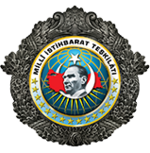- Oct 3, 2018
- 3,326

| National Intelligence Organization Millî İstihbarat Teşkilatı) |
Information presented in the General Overview seen below is considered public, something that would be found on a wikipedia article. The only exception is personnel size, which is listed publicly as being "greater than 15,000", but with overall numbers remaining classified; all classified information is listed with particular information regarding concurrent operations or operations not having been declassified is under strict classification laws of the Republic. Exceptions will be listed with a |DECLASSIFIED| statement.
| General Overview |
|---|
| Headquarters | KALE, Etimesgut, Ankara |
Agency Executives | Director (Teşkilat Başkanı): İbrahim Kalın
|
The National Intelligence Organization (Turkish: Millî İstihbarat Teşkilatı), also known by its Turkish initials MİT, or colloquially as the Teşkilatı, is an intelligence agency of the Turkish government tasked with gathering information of national interests. It gathers information for the Presidency and the Armed Forces about the current and potential threats from inside and outside against all the elements that make up Türkiye's integrity, constitutional order, existence, independence, security, national power, and takes precautions when necessary.
The Teşkilatı is under the provision of the Presidency. It works closely with the Turkish diplomatic missions overseas. In addition, it is an ad hoc participant in Council of Ministers meetings. The Organization is headed by a Director-General, who is appointed by the President of Türkiye. The Director-General is typically a career intelligence officer with vast experience in intelligence and security matters
The organization is divided into various departments and units, each specializing in specific areas of intelligence, counterterrorism, and analysis. These units include the Counterterrorism Department, Foreign Relations Department, Signals Intelligence Department, and more.
The Teşkilatı is in charge of collecting intelligence on existing and potential threats from internal and external sources posed against the territory, people, and integrity, the existence, independence, security, and all the other elements that compose the constitutional order and the national power of the Republic of Türkiye. The Teşkilatı is in charge of communicating this intelligence to the President, the Chief of the General Staff, the Secretariat of the National Security Council, and other relevant state organizations as necessary.
The Teşkilatı is in charge of counterintelligence activities in Türkiye. Legally, it cannot be given any other duty and cannot be led to any other field of activity than collecting intelligence concerning the security of the Republic. The MİT engages in cyber warfare. The Turkish Ministry of National Defence considers cybersecurity as the country's "fifth frontier" after land, air, sea, and space. The Teşkilatı uses local cybersecurity solutions mostly developed by companies like HAVELSAN and the Scientific and Technological Research Council of Türkiye.

SECRET |
Director of the National Intelligence Service |

Hakan Ağçay |
| Director-General Hakan Ağçay was appointed by President Abdullah Gül on the recommendation of the Turkish Intelligence Community and National Security Council. Director-General Ağçay has over two decades of experience in the MİT. Ağçay began his service as a field operative, later rising to become a case officer with oversight of multiple assets, including three field operatives and a network of Syrian informants. His ability to manage sensitive human intelligence operations in high-risk environments earned the recognition of his superiors and accelerated his advancement. Ağçay played a pivotal role in disrupting PKK activities abroad, with the intelligence he supplied directly contributing to the neutralization of key operatives in London, The Hague, and Berlin. His work was equally crucial in preventing several planned terrorist attacks on Turkish soil. Leveraging his deep ties within both Kurdish and Syrian Arab communities, Ağçay established a reliable network of sources that significantly enhanced Türkiye’s regional situational awareness. His appointment as Station Chief at the Turkish Embassy in Damascus marked a critical period in MİT’s operational presence in Syria. During his tenure, Ağçay was credited with expanding Ankara’s reach into the Syrian conflict zone and he returned to lead the MİT’s Operations Directorate. Director-General Ağçay's leadership has been welcomed across the intelligence community, with his selection widely seen as a commitment to maintaining MİT’s operational independence and insulating the agency from partisan influence. |
National Intelligence Service Operations Personnel

MİT Field Operatives 500/500 | 
MİT Intelligence Operatives 250/250 |

MİT Case Officer 195/195 |

MİT Operations Team 182/182 | 
MİT Black Operations Team 100/100 |

MİT Special Operations Force 200/200 |

55/55 |

1,000/1,000 |

2,000/2,000 |
Last edited:




